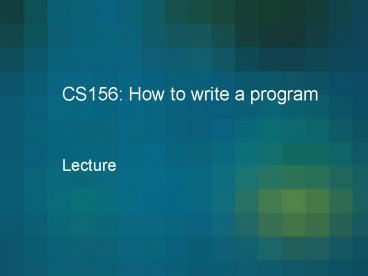CS156: How to write a program - PowerPoint PPT Presentation
1 / 14
Title:
CS156: How to write a program
Description:
Many programs will do what we want, but few will be good ... Syntax highlighting helps. Logic errors occur when the program does not perform as expected. ... – PowerPoint PPT presentation
Number of Views:27
Avg rating:3.0/5.0
Title: CS156: How to write a program
1
CS156 How to write a program
- Lecture
2
Hello World 1
- A simple hello world example
/
hello_world.c Purpose Say hello to the
world. /
include ltstdio.hgt int main() // Say
hello printf(Hello, world.\n) return 0
3
Hello World 2
- An obfuscated hello world example
- Whaaaa?
- Many programs will do what we want, but few will
be good programs.
includeltstdio.hgt main() int
x0,y14,zy(z)0x48(z)yx0x1D
(z)yx0x07(z)yx0x00(z)y
x0x03 (z)yx-0x43(z)yx-0x
0C(z)yx0x57 (z)yx-0x08(z
)yx0x03(z)yx-0x06
(z)yx-0x08(z)yx-0x43(z)yx-
0x21 x(--z)while(yx!NULL)putchar(yx)
4
Signs of a Good Program
- Effective - The first goal of a program is to be
correct. - Simple The program should be only as complex as
necessary to solve the problem. - Documented A programmer unfamiliar with the
program should be able to easily understand what
it does and how. - Robust The program should handle unexpected
events gracefully.
5
Signs of a Bad Program
- Lack of useful comments and documentation
- Overly complex, e.g. sorting a list to find the
maximum element - Clever code is hard to interpret and modify.
- Many things can be done multiple ways in C,
choosing the shortest way is not always the best
idea.
6
Why does good programming matter?
- Programs often outlive their expected lifetime.
- Programs often outlive the programmers short term
memory. - Most useful code will end up being modified by
someone who did not write it.
7
A Few Style Tips
- Break your program into blocks
- Document the purpose of each block and how it
works. - Use meaningful variable names.
- Use the simplest effective code.
8
Practical Program Writing What to do.
- Understand what the program should do.
- Describe the program in pseudocode.
- Write the code from the top down.
- Work in steps. Write/Compile/Test/Repeat
9
Practical Program Writing What not to do.
- Dont try to write the program without any
planning of forethought. - Dont try to write the program all at once.
- Dont send me your code and ask me to tell you
what is wrong with it. - Dont wait until the last minute.
10
Bugs and Errors
- Bug is a programmers euphemism for error
- Syntax errors occur when a program does not
follow the rules defined by the C language.
Syntax highlighting helps. - Logic errors occur when the program does not
perform as expected. Planning and pseudocode
helps.
11
Correcting Syntax Errors
- The compiler detects and describes syntax errors
during compilation. - Often, a single error will cause the compiler to
detect many errors later in the code. - It is best to try to correct the errors one at a
time. This will keep you from spending time
trying to correct phantom errors.
12
Example
/
example3-1.c a bad example
/ in
clude ltstdio.hgt int main() float
friction foat number // assign some
values friction .04 number friction 3.2
2 // print number printf(The final number
was f\n, number) printf(The value of
\friction\ was f.\n,friction) return 0
13
Example
preisnergt gcc example3-1.c example3-1.c In
function main example3-1.c10 error foat
undeclared (first use in this function) example3-1
.c10 error (Each undeclared identifier is
reported only once example3-1.c10 error for
each function it appears in.) example3-1.c10
error syntax error before number example3-1.c1
4 error number undeclared (first use in this
function) example3-1.c14 error syntax error
before numeric constant example3-1.c17 error
missing terminating " character example3-1.c18
error syntax error before token
- The error messages give the file, function, and
line number of the error. A description of the
error is also given. - Sometimes, an error is not detected until several
lines after it actually occurred. The line
number can be misleading.
14
Finding and Correcting Logical Errors
- Writing a program in stages help in avoiding
logical errors. - To correct logical errors, try to localize the
error to a small portion of code. - Test just this piece by commenting out other
parts of the code or making a separate test
program. - Use printf to give you the values of variables at
various points in the program. - Use your brain, dont work at random.

